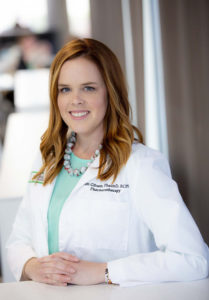Pharmacy faculty member appointed to prestigious specialty post
By Diane Smith
Dr. Caitlin Gibson is a pharmacist, but when she manages medications, her workspace isn’t behind a drugstore counter – it’s the cardiovascular unit of a North Texas hospital.
“There’s no mandate that pharmacists have to be involved in a multi-disciplinary team, but it’s really where we are trying to push the profession,” Dr. Gibson said. “We know that we are experts at managing medications, checking for drug interactions, optimizing care and improving patient outcomes – so that’s part of our mission, to advance what pharmacists are doing in a hospital.”
Dr. Gibson, PharmD, BCPS, BCCP, is an Associate Professor and Vice Chair for Pharmacotherapy at the College of Pharmacy at The University of North Texas Health Science Center at Fort Worth.
She is also a clinical pharmacist at Medical City Arlington’s Heart and Vascular Center and the Cardiovascular ICU, where she does medical rounds with doctors and provides medication recommendations to teams and counseling to patients.
Dr. Gibson was recently appointed to the Board of Pharmacy Specialties (BPS) Cardiology Pharmacy Specialty Council. In this role, she will recommend standards for certification and recertification for pharmacists who seek a cardiology specialty in an evolving health care industry.
The BPS awards certifications to pharmacists in certain clinical areas of expertise. Pharmacists earn certifications through rigorous testing and maintain their credentials through continuous education or re-testing.
“The certifications are meant to show that you are practicing at the top of your license – that you are pushing the boundaries of pharmacy or that you are practicing in an area where traditionally pharmacists haven’t occupied that space,” Dr. Gibson said.
The council oversees the Board Certified Cardiology Pharmacists (BCCP) program, which is a credential for pharmacists who specialize in the delivery of direct patient care and work as members of inter-professional health care teams to treat patients with cardiovascular disease.
The council is made up of seven pharmacists with the BCCP certification and two pharmacists with certifications in other areas of practice.
Dr. Gibson’s appointment is for three years with an option to renew for one additional term. Her council work includes developing exam questions and determining the key competencies for pharmacists certified as cardiology specialists. She will also review applications to determine who is eligible to sit for exams.
“We couldn’t be more proud of Dr. Gibson’s achievements in not only earning the cardiology certification but obtaining this board appointment,” said Dr. S. Suresh Madhavan, Dean of the College of Pharmacy. “This specialization in cardiology pharmacy speaks to the future of pharmacy and the important role pharmacists are playing in patient care and healthcare delivery. Dr. Gibson’s involvement in the Cardiology Pharmacy Specialty Council will enhance our faculty’s knowledge and experience in preparing our students for new and emerging specializations and careers in pharmacy.”
Specialty certifications are considered the gold standard for demonstrating that pharmacists are qualified to contribute at advanced practice levels, Dr. Gibson said. There are many specialties in pharmacy, including cardiology, infectious diseases, nutrition, ambulatory care and critical care.
“They are continuing to add more specialties,” she said, explaining that specialty certifications help pharmacists open career opportunities while showing a commitment to advanced patient care.
Cardiology pharmacists see patients one-on-one who are dealing with different health issues, including heart attacks, heart failure, arrhythmias, valve disorders, strokes and hypertension.
Dr. Gibson took the certification exam for cardiology specialty the first time it was offered in October 2018. Her certification lasts seven years.
“At the time, I was only one of 11 pharmacists in Texas who had this certification,” she said.
The specialty certification allows pharmacists to demonstrate value and integrate into multidisciplinary teams more easily, she said.
A shortage of doctors in primary care and clinic settings opens new doors for pharmacists, Dr. Gibson said. In some areas, once a diagnosis is made, pharmacists can help patients with diseases such as diabetes or hypertension manage medications.
“We are seeing more and more opportunities all the time,” Dr. Gibson said.



![Uyen Sa Nguyen Scaled[58]](https://www.unthsc.edu/newsroom/wp-content/uploads/sites/16/Uyen-Sa-Nguyen-scaled58-145x175.jpg)


Social media